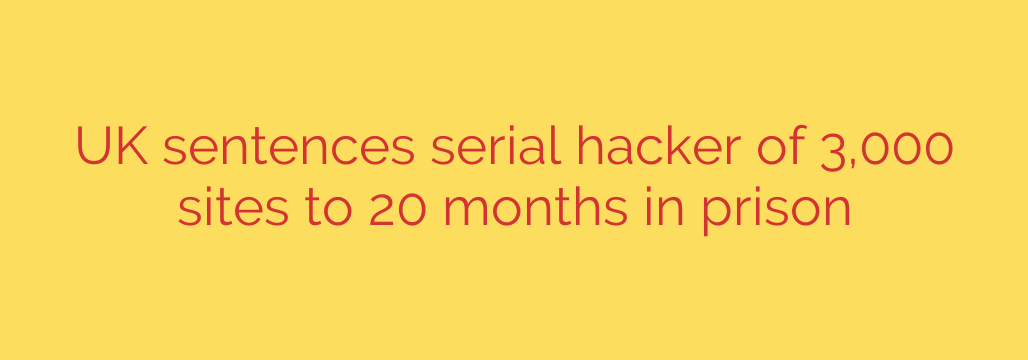
UK Hacker Jailed for Breaching 3,000 Websites: A Wake-Up Call for Digital Security
In a significant ruling that underscores the growing seriousness of cybercrime, a British hacker has been sentenced to 20 months in prison for a relentless campaign that compromised thousands of websites and exposed vast amounts of sensitive user data. This case serves as a stark reminder for businesses and website owners about the critical importance of robust cybersecurity measures.
The cybercriminal orchestrated a series of sophisticated attacks, successfully breaching the defenses of more than 3,000 websites worldwide. The primary goal of these intrusions was to steal valuable information stored in website databases. The stolen data included a trove of personally identifiable information (PII), such as full names, email addresses, usernames, and passwords, which were then offered for sale on dark web marketplaces.
The Anatomy of the Attack
Investigators revealed that the hacker primarily used a well-known but highly effective technique known as SQL injection (SQLi). This type of attack exploits vulnerabilities in a website’s code, specifically in how it handles data submitted through forms (like login pages or contact forms).
By inputting malicious code instead of standard information, the attacker was able to trick the website’s database into revealing its contents. This method is particularly effective against websites that are outdated, poorly configured, or running on unpatched software, highlighting a common weak point in digital infrastructure.
The successful prosecution was the result of a meticulous investigation by law enforcement, which tracked the hacker’s digital footprint across multiple jurisdictions. The 20-month prison sentence sends a clear message that authorities are cracking down on cybercrime and that those who engage in such activities will face severe, real-world consequences.
Lessons Learned: How to Protect Your Digital Assets
This incident is not just a news story; it’s a crucial lesson in proactive digital defense. For any individual or organization running a website, preventing such attacks is paramount. Here are essential, actionable steps you can take to fortify your website’s security:
- Keep Everything Updated: The single most important step is to ensure your website’s core software (like WordPress, Joomla, or Magento), themes, and plugins are always running the latest versions. Developers regularly release security patches to fix vulnerabilities like the ones exploited in this case.
- Implement a Web Application Firewall (WAF): A WAF acts as a protective shield between your website and incoming traffic. It can automatically detect and block malicious requests, including SQL injection attempts, before they ever reach your server.
- Enforce Strong Password Policies: Ensure that all admin, editor, and user accounts use strong, unique passwords. Combining uppercase and lowercase letters, numbers, and symbols is essential. Consider implementing two-factor authentication (2FA) for an added layer of security on administrative accounts.
- Sanitize and Validate User Inputs: This is a crucial back-end security measure. Your website’s code should be written to treat all data submitted by users as potentially untrustworthy. By cleaning and validating this input, you can prevent malicious code from being executed.
- Conduct Regular Security Audits: Don’t wait for a breach to find your weaknesses. Proactively scan your website for vulnerabilities using reputable security tools or hire a professional to conduct a penetration test. Regularly reviewing your security posture can help you identify and fix security holes before attackers can find them.
The conviction of this serial hacker demonstrates that digital crime has tangible consequences. For website owners, the takeaway is clear: cybersecurity is not an option—it is a fundamental responsibility. Taking proactive steps to secure your digital presence is the best way to protect your business, your data, and your users from becoming the next headline.
Source: https://www.bleepingcomputer.com/news/legal/uk-sentences-serial-hacker-of-3-000-sites-to-20-months-in-prison/








